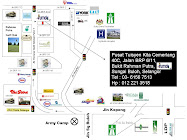The Literature Component in the English Language Curriculum
for Secondary Schools
Aims
The aim of this component is to enhance students' proficiency in the English language
through the study of a set of prescribed literary texts, contribute to personal delopment
and character building, and broaden students' outlook through reading about other cultures and world views.
Objectives
By the end of the secondary school English language proramme, students should be able to:
• give a personal response to texts;
• show an awareness of how language is used to achieve a paticular purpose;
• reflect upon and draw valuable moral lessons from the issues and concerns of life as
portrayed in the literary works and relate them to one's life; and
• understand and appreciate other cultures,
1.0 Listening and Speaking
Students should be able to:
1.1 listen to and understand poetry and prose;
1.2 recite poems with correct intonation, stress, rhythm, and enunciation;
1.3 retell what the text is about in their own words;
1.4 narrate sequence of events;
1.5 discuss the theme and message;
1.6 discuss plot, character; setting and author's point of view;
1.7 compare and contrast characters;
1.8 make inferences and draw conclusions about theme, message, character, and
author's point of view;
1.9 discuss the values explored in the text;
1.10 relate events, characters, values and messages in texts to one's own life;
1.11 discuss how the author / poet uses language to achieve a particular purposes;
1.12 give an informed personal response to the text; and
1.13 dramatize texts and role play characters;
2.0 Reading
Students should be able to:
2.1 read aloud poetry and prose with correct stress, intonation, pronunciation and
expression;
2.2 read and understand poetry and prose;
2.3 follow sequence of events;
2.4 read and describe plot, character, setting and author's point of view;
2.5 compare and contrast characters;
2.6 read and give the meaning of a poem as they understand it within context;
2.7 identify themes in stories, and messages in poems;
2.8 relate events, characters, values and messages in texts to one's own life;
2.9 draw values and lessons from the text;6
2.10 make inferences and draw conclusions about theme, message, characters, and
author’s point of vies;
2.11 recognise and understand how a poet / author uses language to achieve a particular purpose; and
2.12 read and dramatize texts.
3. Writing
Students should able to:
3.1 write out the sequence of events in texts;
3.2 describe plot, character, setting and author’s point of view;
3.3 compare and contrast characters;
3.4 explain themes and messages in stories and poems;
3.5 relate events, characters, values and message in texts to one’s own life;
3.6 paraphrase poems;
3.7 summarise the text briefly;
3.8 give a personal response to the text; and
3.9 compose short poems and write bries stories.
skip to main |
skip to sidebar



pusattuisyenkitacemerlang@yahoo.com
We provide 1. Quality Teaching To Encourage Your Child's Learning Desire. 2. Quality Learning To Build Your Child's Self Confidence. 3.Quality Growing To Shape Your Child's Future. Email: pusattuisyenkitacemerlang@yahoo.com
Principal

Motivator and Academic Counselor

Location

pusattuisyenkitacemerlang@yahoo.com
Sharing Subjects
- Adat Melayu (6)
- B.Melayu - Karangan (1)
- KC 伟 杰 课 室 (25)
- KC 伟 杰 课 室 Proverb (17)
- KC 伟 杰 课 室 Reborn (15)
- KC 伟 杰 课 室- Travel (1)
- KC 伟 杰 课 室-出国留学 (14)
- KC 伟杰课室 - 教育 (10)
- KC 伟杰课室学习 (8)
- Kita Cemerlang (12)
- Kita Cemerlang - Sharing (106)
- Kita Cemerlang 雙溪毛糯- Work? (10)
- Komsas (6)
- Math Reference Tables (10)
- Maths Olympics (8)
- Photos (4)
- PMR - BM作文 (12)
- PMR - 华文 (17)
- PMR - 华文作文 (25)
- PMR - 英语 (1)
- PMR - 英语作文 (6)
- PMR-华语-孔子 (4)
- Science - Chemistry (9)
- SPM - B. M-Tatabahasa (2)
- SPM - BM作文 (20)
- SPM 华文 (4)
- SPM 华文作文 (3)
- STPM 华文 (4)
- STPM 华文作文 (1)
- Teacher (7)
- UPSR - 华语 (2)
- UPSR - 华语作文 (54)
- UPSR - 成语故事 (9)
- UPSR B.English (13)
- UPSR B.English - Grammar (28)
- UPSR B.English - Story (7)
- UPSR B.English Essay (16)
- UPSR B.M- Nilai Murni (5)
- UPSR B.Melayu (3)
- UPSR B.Melayu - Karangan (15)
- UPSR B.Melayu - Tatabahasa (20)
- UPSR Mathematic (11)
- UPSR- 华语 (39)
- UPSR- 华语古文 (21)
- UPSR- 科学 (17)